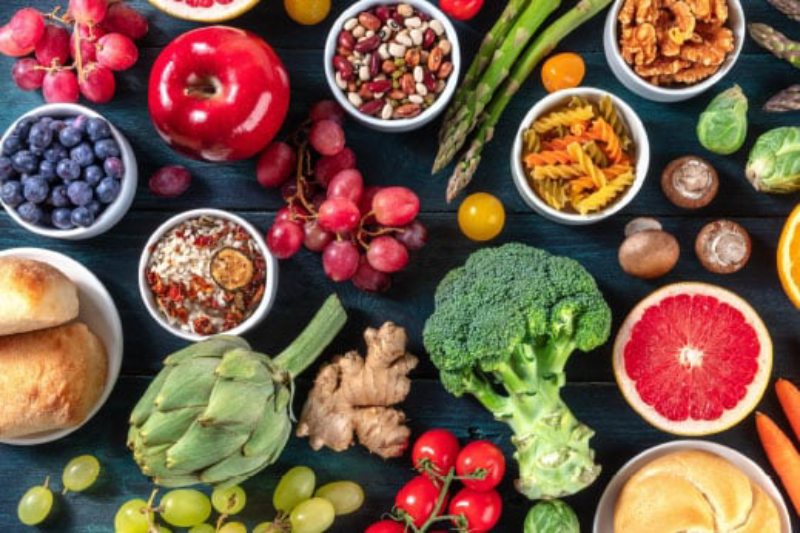In 2024, you might want to try something different if you’ve been following the “New Year, New You” mindset and working out seven days a week while restricting your favorite meals, only to give up after a few weeks. Dietitians concur that adding foods to your diet rather than removing them is frequently what makes the biggest differences in terms of health.
Including more nutrient-dense meals that are high in antioxidants, fiber, lean protein, and important micronutrients can significantly improve your health and daily mood, even if no one food can make or break your health. The foods you frequently eat can help you achieve your goals, whether they be to lower your cholesterol, manage or maintain a healthy weight, lower your blood sugar, strengthen your immune system, or just feel more energised every day.
Here are ten foods that dietitians recommend you consume more of in order to improve your health in the next year. Continue reading and see The 20 Best High-Protein, Low-Calorie Foods for further dietary advice.
legumes
According to Sarah Pflugradt, MS, RDN, CSCS, “adding a serving or two of beans each day may make a significant impact on the diet by adding nutrients such as iron, magnesium, and folate.” Beans are a terrific addition to any diet that aims to include more plants because they are high in fiber and protein. Black beans include 7.5 grams of protein and 7.5 grams of fiber in only half a cup.
“Regular bean consumption has also been shown to improve glucose control and lower cholesterol,” Pflugradt continues. A 2021 study published in the Journal of Nutrition showed that eating one cup of beans (of any kind) every day for four weeks helped persons with high LDL cholesterol lower their overall and LDL cholesterol levels.
Oats
“Oats are a highly accessible food for overall health because they are affordable, versatile, and shelf-stable,” says Wan Na Chun (she/her), RDN, a registered dietitian nutritionist and nutrition consultant for Health Insiders.
Eating more oats can have a significant impact, whether you prefer them in granola, overnight oats, hot oats, or baked into breads and muffins. Although they are a strong source of iron and magnesium, soluble fiber is their main nutritional component. “Oats are rich in soluble fiber, which can help lower cholesterol, stabilize blood sugar levels, and reduce the risk of heart disease,” says Chun.
Nuts
According to Patricia Kolesa MS, RDN, owner of Dietitian Dish LLC, “nuts are a great source of fiber and plant-based protein, whether it’s walnuts, almonds, peanuts, or pistachios.” Almonds include 3.5 grams of fiber, 6 grams of protein, and a good amount of magnesium, copper, and riboflavin in only one ounce, or roughly a modest handful.
“Nuts make a great snack, but some people are worried about eating them because they are high in calories,” explains Bess Berger, RD, a registered dietitian at Nutrition by Bess who specializes in PCOS and menopause.
Indeed, over the course of the 20–24 years that participants were observed, a 0.5 serving daily increase in nut intake was associated with decreased rates of obesity and weight gain, according to a 2019 analysis of the diets, health, and weight of nearly 145,000 adults.
Seaweed
“Seaweed is a low-calorie food item that packs a lot of health power,” explains Nutrition Insights PLLC owner Amy Bene, MS RD CDCES.
Seaweed comes in a variety of forms that are delicious, such as dried spirulina, kelp, and nori, which is used in many Asian dishes. Seaweed is low in fat and calories and high in antioxidants, protein, fiber, and a variety of vitamins and minerals.
There are lots of possibilities to explore new foods if you’re not sure how to include them in your diet. “Seaweed is often served with sushi, in miso soup, prepared dried as a snack or added to many different recipes including stir fry’s or wraps,” Beney says.
You may also get packages of dried seaweed “chips” in many grocery stores or online for healthier snacking.
Berries
Eating more berries is beneficial to your health, whether you eat them by the handful, mashed into a jam, over toast, or added to cereal. “Berries are not only high in fiber and immune-boosting vitamin C, but they are also a rich source of antioxidants,” explains Danielle VenHuizen, RD, owner of Food Sense Nutrition in Seattle.
“Berries may boost mood and reduce anxiety, which can have a profound effect on overall health,” VenHuizen continues. Berries may have a strong mood-influencing effect because of their high flavonoid content. Research has indicated that consuming a single cup of berries can positively impact children and young adults’ executive function, which encompasses working memory, planning, problem-solving, and attentional and behavioral guidance.
Kale
According to Lisa Andrews, MEd, RD, LD, “eating kale and other green leafy vegetables daily may reduce your risk of dementia.”
Nutrients including lutein, folate, β-carotene, and phylloquinone, which are abundant in leafy greens, have neuroprotective properties that can delay age-related cognitive impairments. Even one meal per day could help you maintain mental acuity as you age.
Fish tuna
According to dietitian Chelsea LeBlanc, RDN, LD, owner of Chelsea LeBlanc Nutrition in Nashville, “try having fatty fish (like salmon or tuna) two times per week to boost your memory, keep your vision sharp, and decrease your risk for heart disease.”
Eat at least two 3.5-ounce portions of fish, particularly fatty fish, every week, according to the American Heart Association, as diets rich in omega-3 fatty acids from fish can help lower the risk of heart disease. Although most individuals don’t follow these guidelines, it’s actually quite simple to achieve this aim.
“It can be as simple as adding lox to your avocado toast, tuna to your salad, or making a simple sheet pan salmon,” LeBlanc says.
Watercress
“Watercress has many plant compounds, including one called Phenethyl isothiocyanate (PEITC), which may have anti-cancer properties,” claims Lauren Manaker, MS, RDN, LD. Although it’s not as popular as spinach or kale, this leafy green’s peppery flavor goes well with a wide range of dishes, and it gets softer when cooked. This green can be blended into a delightful pesto or used to salads, soups, stir-fries, and sandwiches.
Yogurt
Consuming more yogurt can have a big influence on your health, particularly low-sugar, high-protein types with live, active cultures. According to a 2020 review, diets rich in fermented milk products, such as yogurt, are linked to a lower risk of type 2 diabetes, breast and colon cancer, as well as a healthier weight and better heart, bone, and gastrointestinal health.
Enjoy it as a standalone snack, dip for apples or bananas, blend it into smoothies, or have a yogurt, granola, and berry parfait for breakfast!
Water
“Dehydration can sometimes be the cause of people feeling exhausted or lethargic,” explains Alyssa Smolen MS RDN, a nutritionist based in New Jersey. The answer? Increase your water intake. Water entered our list despite not being a food because of its importance.
“Water helps maintain temperature, helps get rid of waste, and contributes to electrolyte balance,” Smolen continues. To boost intake and enjoyment, she suggests investing in a new water container that you’ll want to carry about and adding flavored or sparkling waters like LaCroix or Spindrift.











